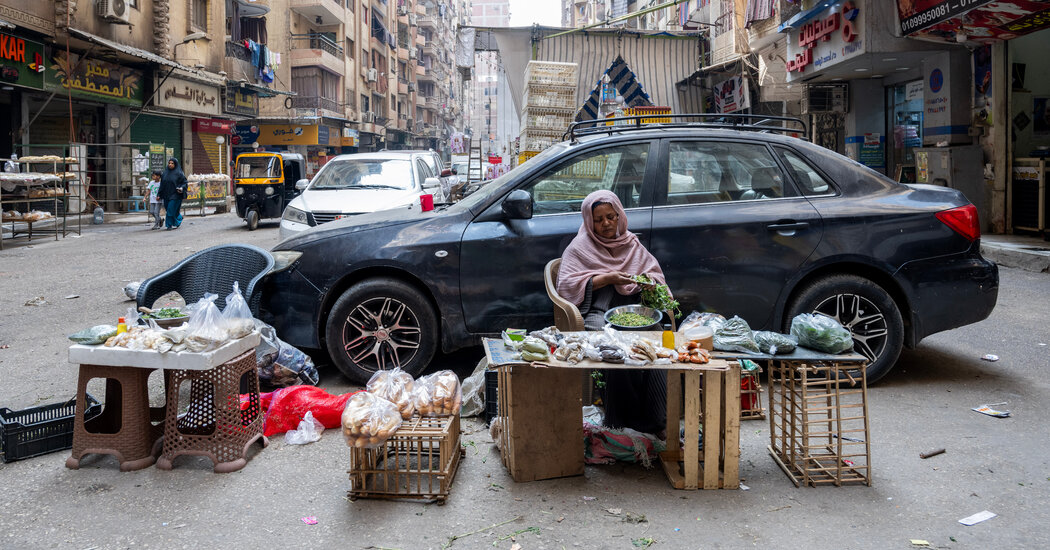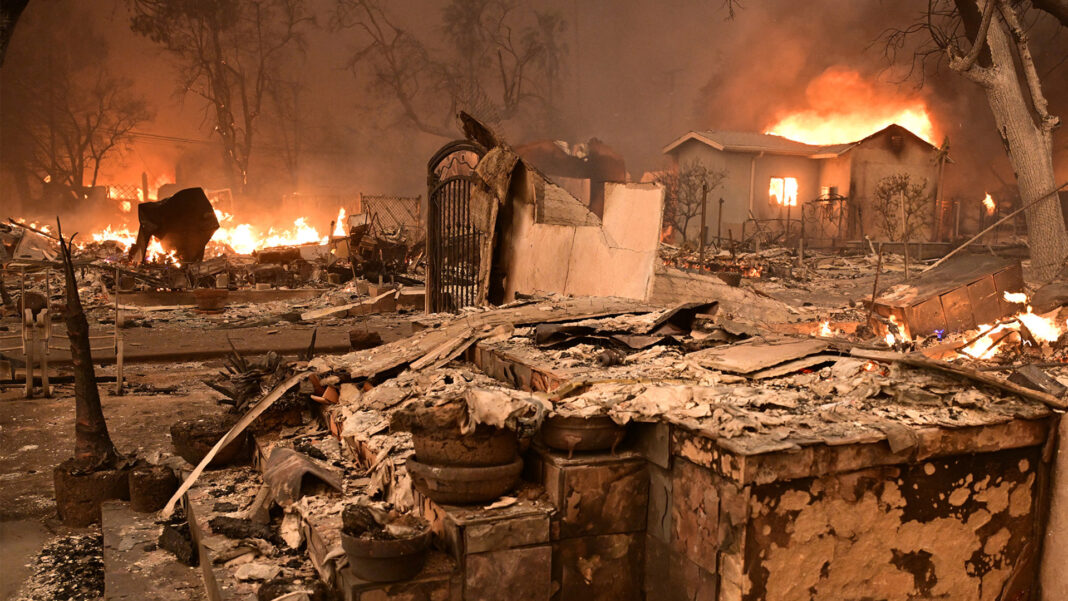In easier times for Egypt’s refugees, Azza Mostafa, a pro-government TV anchor, had nothing but generous words for the many thousands of Syrians who had built new lives in Egypt after their own country imploded into civil war in 2011.
“I’d like to say to our Syrian families and our brothers in Egypt,” she said in a 2019 broadcast, “you’ve truly brought light to Egypt.”
But there she was on her show in June, fulminating against Egypt’s growing number of outsiders — an echo of the country’s leaders, whose policy toward refugees and migrants has hardened as they wrestle with an economic crisis made worse by wars in neighboring Gaza, Sudan and Libya.
“This has become unbearable,” Ms. Mostafa said, accusing migrants of driving up rents and promoting female genital mutilation. “There are many acts of overstepping bounds. Is that acceptable? After we opened our country for them?”
Egypt long made it easy for foreigners of all kinds to live and work in the country, largely without interference, whether they were refugees, migrant workers or Westerners escaping coronavirus lockdowns.
The past 13 years have brought a near unbroken stream of newcomers fleeing conflict to the country that is known among Arabs as the “mother of the world.” That includes not just Syrians but also Sudanese, Yemenis, Eritreans and, most recently, Palestinians from Gaza.
Egypt’s lax immigration rules meant many never formally registered as refugees or received official permission to stay long-term, yet managed to stitch themselves almost seamlessly into the country, supporting themselves and sometimes starting businesses.
Since Sudan’s civil war drove a surge of refugees to Egypt starting in 2023, however, the impoverished government in Cairo has complained louder and louder about the burden of foreigners. It rapidly tightened its policies — hoping, analysts and diplomats say, to win more support from international backers eager to prevent migration to their own countries.
Egypt says it spends $10 billion each year on its nine million refugees, according to officials and government-controlled media (though experts say both numbers are greatly exaggerated), all while Egyptians endure soaring prices and subsidy cuts.
Years of government overspending, reliance on imports and policies that neglected private-sector growth left the country’s finances in precarious shape before the wars in Ukraine and Gaza sent them crashing. Egypt lost $7 billion in crucial revenue from the Suez Canal in 2024 as the conflict in Gaza has squeezed shipping in the Red Sea, according to government officials.
With Egypt deep in debt and hard-pressed to pay for imports such as wheat and energy, the currency has crashed, while some goods have become difficult to find.
Ahmed Abu Al-Yazid, the head of a government-owned sugar firm, the Delta Sugar Company, blamed refugees for a sugar shortage that experts link to the economic crisis. The president accused them of draining Egypt’s precious water. On social media, pro-government accounts — some of which appeared to be fake — accused Sudanese refugees of driving up rents and promoting female genital mutilation.
A crackdown soon followed the accusations, according to migrants, refugees and their advocates.
Sudanese refugees have been rounded up in police sweeps, detained and summarily deported. Syrians who have lived in Egypt for years have been told to pay thousands of dollars to stay. Many remain hesitant to return, despite the fall of the Assad regime in December, until the situation stabilizes.
Foreign workers from Asia and from other parts of Africa now face extra hurdles to keep their legal status, and in some cases, have been arrested to compel them to pay high fees, advocates say.
Last month, Egypt passed a law that would hand responsibility for screening refugees and others to the government, instead of to the United Nations refugee agency.
Government officials said the measure would ensure a wide array of refugee rights. Critics of the move, however, said that it would become far harder for refugees to gain protection or access to health care and schools. The law also empowers the government to revoke refugee status on vague grounds such as breaches of national security, political activity or violations of Egyptian social customs.
Abu Saleh, 32, a Syrian who works in a small Cairo grocery, said he had lived in the city for 13 years “without a single issue” until he discovered in July that he could no longer enroll his son in school without a residence permit.
Just to renew his family’s tourist visas, he said, he was told that he would have to return to Syria and pay $2,000 per person in fees — a process he would have to repeat every six months.
“Egypt has been there for us all along,” said Abu Saleh, who asked to be identified by the name he uses around town to avoid possible repercussions. “I’d like to appeal to the government of Egypt: Give us residence, even if it’s a little more expensive. We’re facing tough conditions.”
Egypt has not explained its hardening attitude toward foreigners. But analysts and migrant advocates tie it to the economic crisis, which has generated widespread bitterness and undermined President Abdel Fattah el-Sisi’s rule.
The newcomers make convenient scapegoats for Egyptians’ hardships, rights groups say. Immigration fees, charged in dollars, can supply some of the foreign currency that Egypt badly needs. And foreigners are also valuable pawns in Egypt’s quest for more financial support from its international partners, rights groups say.
“They think, ‘How can these people be useful for the government?’” said Nour Khalil, executive director of the Refugees Platform in Egypt, which advocates for migrants’ rights.
The U.N. refugee agency counts about 818,000 registered refugees in Egypt, who are entitled to free public health care and education. There are likely many more unregistered refugees, though analysts and aid workers dispute the figure reaches nine million.
The benefits that registered refugees receive mean that Egypt “is treating them like Egyptians, despite the fact that we are not a rich country,” the foreign minister, Badr Abdelatty, said at a news conference last month. “There is no country in the world assuming these responsibilities and challenges like here in Egypt. We don’t have one single refugee camp — they are fully integrated in society.”
Refugee advocates agree that Egypt needs more resources. Unlike other countries in the region, including Jordan, Lebanon and Turkey, where the United States, the United Nations and the European Union have poured billions into supporting refugees, Egypt has not received significant funds to help house Syrian or other refugees.
That is changing.
As the war in Gaza has pounded Egypt’s finances, Western backers have rushed to Egypt’s aid, anxious to prevent an economic collapse in the Arab world’s most populous country, analysts and diplomats say. A crash in Egypt could further destabilize the Middle East and send a deluge of migrants across the Mediterranean Sea to Europe, where there is heavy public pressure to restrict migration.
The European Union pledged a fast-tracked $8 billion aid package to Egypt in March, echoing deals the bloc has struck with Mauritania, Tunisia and Turkey that funded migration enforcement in those countries.
Other backers, including the International Monetary Fund, have sent billions more to stabilize Egypt’s economy.
Critics say the European pact with Egypt, like the bloc’s other migration deals, is enabling rights abuses by rewarding Mr. el-Sisi’s authoritarianism and potentially funding the current crackdown on migrants.
Groups including Amnesty International and the Refugees Platform in Egypt have documented what they say is a pattern of mass arbitrary arrests and unlawful deportations of Sudanese refugees — some detained as they were smuggled across the border, others rounded up during random sweeps of predominantly Sudanese neighborhoods.
Some Syrians, too, have been expelled, Mr. Khalil of the refugees platform said. His group has also documented more than 50 arrests of foreign workers, some of whom already had residency, who were held until they paid $1,000 in fees and fines, he said.
An atmosphere of fear has brought throngs of Sudanese to the doorstep of the U.N. refugee agency in Cairo, seeking formal protection. But refugee status can take months, if not years, to obtain: Appointments to begin the process are not available until late 2025. And some of the Sudanese who have been detained and deported, Mr. Khalil said, held some form of U.N. identification, casting doubt on whether the organization could guarantee security.
Among those waiting outside one morning was Mohammed Abdelwahab, 36. By the time he and his family tried to cross the border from Sudan this spring, Egypt had tightly restricted what had been free-flowing movement between the two countries, so they resorted to smugglers instead.
Without legal papers, Mr. Abdelwahab and his 14-year-old son, Mohanad, collected plastic bottles on Cairo’s streets for a living. Mr. Abdelwahab was looking for better work one day in June when Mohanad disappeared.
Twenty days later, Mohanad resurfaced with a WhatsApp message: He had been rounded up with a group of other Sudanese and deported.
Mr. Abdelwahab had been looking for Mohanad in another city. When he returned to Cairo, his wife and three other children had been evicted for nonpayment.
“It’s indescribable,” he said. “Now they’re all camping out here,” he added, referring to his family and indicating the sidewalk in front of the refugee agency, where groups of other Sudanese waited listlessly in the sun.
Emad Mekay and Rania Khaled contributed reporting.


